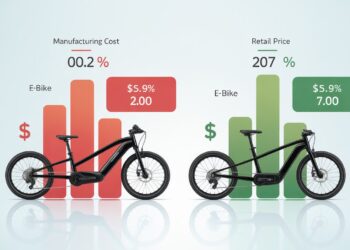Why Electric Bikes Are in the Spotlight
Electric bikes are rapidly gaining popularity in cities and suburbs alike. Promising a clean, efficient, and affordable mode of transport, they appear to be a smart solution for personal mobility. But beyond the convenience—how do electric bikes actually impact the environment?
Let’s explore whether electric bikes are truly eco-friendly, or if they have a hidden environmental cost.
How Electric Bikes Positively Impact the Environment
Electric bikes are often marketed as green alternatives to cars, motorcycles, and even public transport. And for good reason—they dramatically reduce pollution and energy usage in daily commuting.
Electric Bikes Produce Zero Emissions While Riding
Unlike cars or gas-powered scooters, electric bikes produce no tailpipe emissions while in use. They don’t burn fuel or release carbon dioxide, making them ideal for:
- Reducing urban smog
- Cutting down carbon footprints
- Supporting cleaner air in high-traffic zones
Replacing short car trips with electric bikes helps cities breathe easier—literally.
Electric Bikes Use Minimal Energy to Travel

When it comes to efficiency, electric bikes are miles ahead of traditional vehicles:
- They consume 90% less energy than cars
- A full battery charge often costs less than $0.10
- They travel up to 40 miles on that single charge
Compared to electric cars, electric bikes are the smarter choice for daily commuting due to their low energy demands.
Electric Bikes Help Reduce Noise and Traffic Pollution
Cars and motorbikes clog roads and create noise—especially during rush hours. In contrast, electric bikes are:
- Quiet
- Space-efficient
- Able to navigate crowded streets with ease
They’re not only good for the environment, but also help cities become more livable and less chaotic.
Electric Bikes Encourage a More Sustainable Lifestyle

One of the most powerful benefits of electric bikes is how they shift behavior. Many users begin riding more and driving less. This lifestyle change means:
- Lower emissions over time
- Improved public health
- Stronger demand for green infrastructure (bike lanes, EV stations)
Electric bikes can be the gateway to a more sustainable, eco-conscious way of living.
The Environmental Challenges of Electric Bikes
Despite their benefits, electric bikes come with some environmental drawbacks—especially when it comes to how they’re built, charged, and disposed of.
Electric Bikes Depend on Resource-Intensive Batteries
Most electric bikes use lithium-ion batteries, which require metals like lithium, cobalt, and nickel. These materials:
- Are extracted through harmful mining
- Consume large amounts of water
- Contribute to deforestation and ecosystem disruption
So while the ride is clean, the battery’s production isn’t always eco-friendly.
Electric Bikes Can Contribute to Growing E-Waste
E-bike batteries last 2–5 years, and many riders don’t recycle them properly. If thrown away:
- Batteries can leak toxic chemicals
- They become part of the growing e-waste crisis
- Soil and water systems can be damaged
To stay green, electric bikes need better battery recycling programs—and responsible users.
Electric Bikes Are Only as Clean as the Electricity They Use
Charging your electric bike with dirty electricity (from coal or natural gas) still causes pollution at the source. On the other hand:
- Charging via solar or wind makes the ride nearly 100% green
- Using clean energy at home or at work reduces indirect emissions
So yes, electric bikes are cleaner—but not completely carbon-free unless you control how you charge them.
Low-Quality Electric Bikes Add to Short-Term Waste
Many budget electric bikes:
- Have poor-quality components
- Include sealed batteries that can’t be replaced
- Are hard to repair due to lack of spare parts
This “use and throw” model goes against sustainability. High-quality electric bikes are a better long-term investment both environmentally and financially.
Battery Impact of Electric Bikes Compared to Other Vehicles
Let’s break down the environmental footprint of electric bikes compared to other popular transportation options:
| Vehicle | Average Battery Size | Lifespan | Environmental Risk |
|---|---|---|---|
| Electric Bikes | 400–700Wh | 2–5 yrs | Moderate |
| Electric Cars | 40–80kWh | 8–10 yrs | High |
| Gas Cars | N/A | N/A | Very High |
Clearly, electric bikes have a much smaller battery footprint, making them one of the most eco-efficient powered transport choices available today.
How to Use Electric Bikes in the Most Eco-Friendly Way

Buying an e-bike is just the start. To ride truly green, you need to optimize how you use and maintain your electric bike.
Choose Durable, Serviceable Electric Bikes
Don’t go for the cheapest option. Instead:
- Pick models with replaceable batteries
- Choose brands that offer repair support
- Avoid “sealed unit” designs that are hard to fix
A well-maintained electric bike can last up to a decade or more.
Charge Your Electric Bike with Renewable Power
Where possible:
- Use solar charging stations
- Charge during off-peak hours
- Avoid plugging into fossil-fuel-heavy grids
This ensures your electric bike stays as green as it claims to be.
Recycle Your Battery Responsibly
Most e-bike users don’t realize how harmful batteries can be if not disposed of properly. To reduce harm:
- Use official battery take-back programs
- Contact your local municipality for recycling locations
- Never toss batteries in household trash
Responsible recycling ensures your electric bike doesn’t end up harming the planet.
Use Electric Bikes to Replace Car Trips
The biggest environmental benefit comes when electric bikes actually replace car usage. Use them for:
- Daily commuting
- Grocery runs
- School drop-offs
- Weekend errands
The more you rely on your electric bike, the more you cut emissions and urban congestion.
Summary: Are Electric Bikes Truly Green?
Let’s sum it up clearly:
| Factor | Electric Bikes Verdict |
|---|---|
| Emissions During Use | Zero |
| Battery Production Impact | Moderate |
| Energy Efficiency | Excellent |
| Disposal/Recycling Risk | Needs Improvement |
| Urban Sustainability Benefit | High |
Electric bikes are not a perfect solution, but they are dramatically better than cars, motorcycles, and other gas-powered alternatives.
Final Verdict: Electric Bikes Are a Friend—With Responsibility
If used wisely and maintained well, electric bikes are among the most environmentally friendly transportation choices available today. While there are valid concerns around battery sourcing and recycling, the overall picture is still very positive.
To ride responsibly:
- Choose quality models
- Recycle properly
- Charge cleanly
- Replace car trips whenever possible
In doing so, your electric bike becomes not just a tool for transport—but a genuine friend to the planet.
Frequently Asked Questions About Electric Bikes
1. Are electric bikes really better for the environment?
Yes, electric bikes produce zero tailpipe emissions and consume far less energy than cars. They also help reduce traffic congestion and urban pollution. Learn more environmental benefits here:
👉 https://ridethebikes.xyz
2. What happens to electric bike batteries after they die?
Used electric bike batteries should be recycled properly. Many e-bike brands now offer battery recycling programs. Improper disposal can harm the environment.
Learn battery safety and recycling tips here: https://ridethebikes.xyz
3. Are electric bikes sustainable in the long run?
Yes. If maintained well and used instead of cars, electric bikes have a much lower lifetime carbon footprint.
Read battery care and usage guides: https://ridethebikes.xyz
4. Do electric bikes use a lot of electricity?
Not really. Charging an electric bike typically costs just a few cents and uses less electricity than running a laptop for several hours.
Smart charging tips: https://ridethebikes.xyz/best-time-to-charge-e-bike/
5. Where can I learn more about the pros and cons of electric bikes?
You can explore our complete collection of articles, comparisons, and eco-impact guides at:
https://ridethebikes.xyz
6. Is riding an electric bike legal everywhere?
Electric bike laws vary by country and state. Most U.S. states allow them, but local speed limits and helmet rules may apply.
Legal insights and safety info: https://ridethebikes.xyz
7. Are electric bikes supported by environmental agencies?
Yes. E-bikes are recognized as a part of sustainable urban mobility by agencies like the Environmental Protection Agency (EPA).
Bonus: Want to Dive Deeper?
If you’re interested in more electric bike insights, charging tips, riding guides, or maintenance hacks —
Click here to explore related posts on ridethebikes.x








